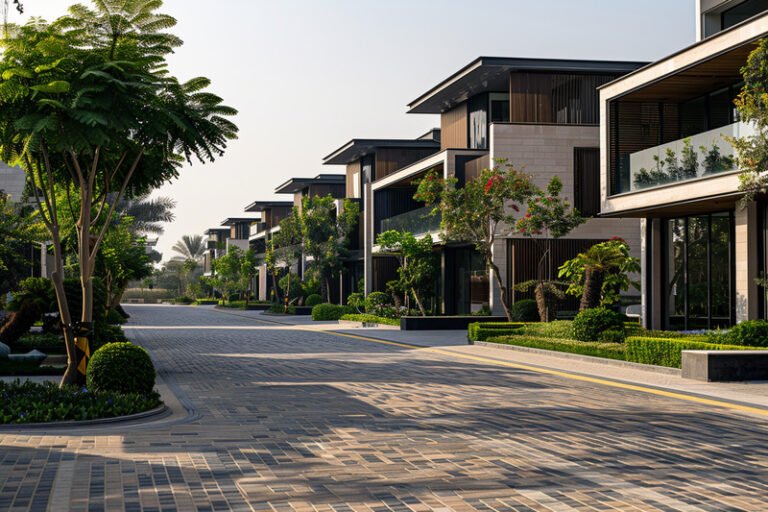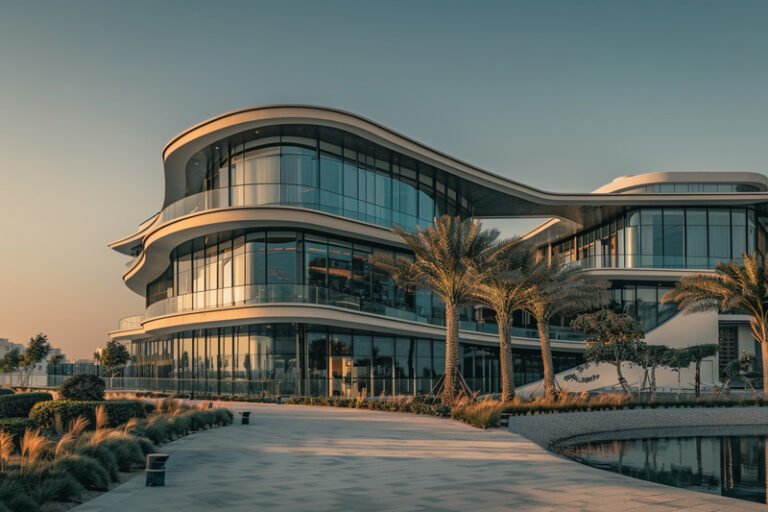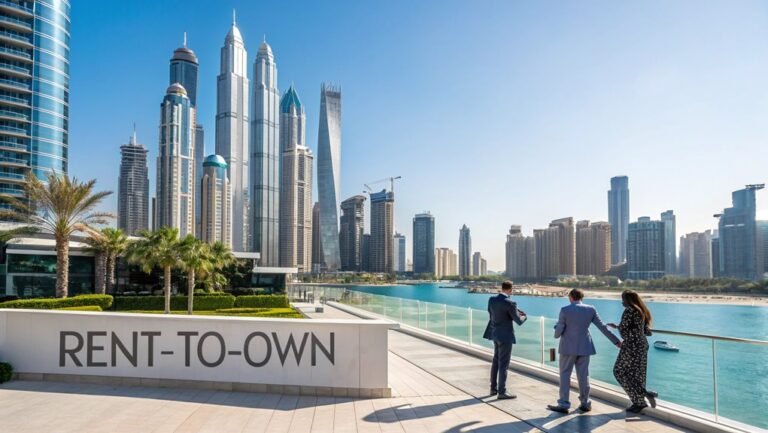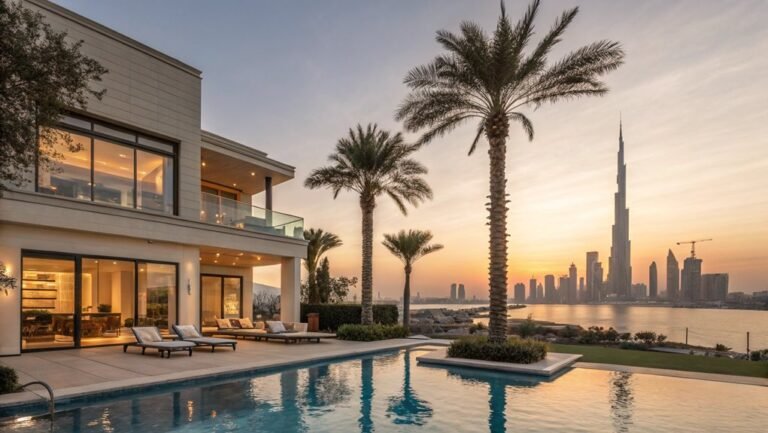Guide for Expats Renting Property in Dubai

When renting property in Dubai as an expat, having the right information is crucial to avoid common pitfalls. Here are some key steps to keep in mind:
- Register your tenancy contract with the Ejari system for legal protection.
- Budget for additional costs like utilities, maintenance fees, and agent commissions.
- Use the RERA Rent Index to understand permissible rent increases.
- Choose neighborhoods based on proximity to work, schools, and amenities.
- Document the property’s condition and set up utilities before moving in.
Understanding Rental Laws
Understanding Dubai’s rental laws can be straightforward if you know the key regulations and your rights as a tenant. Here’s what you need to know:
- Tenancy contracts in Dubai are typically for one year and must be registered with the Ejari system. This ensures the contract is legally binding and protects both parties.
- Make sure the contract clearly states the rent amount, payment terms, and any maintenance responsibilities.
- You have the right to prompt maintenance and repair services from your landlord. If repairs are delayed, you can file a complaint with the Dubai Land Department (DLD).
- Landlords can’t increase rent arbitrarily. Rent hikes are regulated by the Real Estate Regulatory Agency (RERA) and must comply with the RERA Rent Index.
- Security deposits are generally required and should be returned at the end of the tenancy, provided there are no damages beyond normal wear and tear.
- Before signing, thoroughly read the contract and understand all clauses. If something is unclear, seek clarification or legal advice.
- Disputes between tenants and landlords can be resolved through the Rental Dispute Settlement Center. They offer mediation and legal resolution.
Setting Your Budget
Determining your budget is crucial before searching for rental properties in Dubai. Consider the following steps:
- Start by examining your monthly income and expenses. Identify how much you can comfortably allocate towards rent without compromising other financial responsibilities. A common guideline is to spend no more than 30% of your monthly income on housing costs.
- In Dubai, consider additional costs like utility bills, maintenance fees, and potential service charges. Some landlords include these in the rent; others don’t. Clarify this upfront to avoid unforeseen expenses.
- Security deposits are also important. Typically, landlords require a deposit equivalent to one month’s rent. Real estate agents usually charge a commission, often around 5% of the annual rent. Ensure you have funds set aside for these initial costs.
- Plan for annual rent increases. Dubai’s rental market can be dynamic. Use the Rent Index Calculator from the Dubai Land Department to predict potential increases and keep your budget sustainable throughout your lease term.
Choosing a Neighborhood
Selecting the right neighborhood in Dubai is crucial for your rental experience and lifestyle. Consider the following:
Let us help you find the perfect property. Contact us to get started.
- Proximity to your workplace to reduce commute time and avoid traffic.
- If you have children, focus on areas with quality schools like Jumeirah and Al Barsha.
- Think about daily amenities. Downtown Dubai and Dubai Marina offer dining, shopping, and entertainment. For a quieter, family-friendly environment, consider suburban areas like Arabian Ranches or The Springs.
- Public transportation is key. Neighborhoods served by the Dubai Metro, such as Deira and Bur Dubai, make commuting easier if you don’t plan to drive.
- Safety is also essential; Emirates Hills and Palm Jumeirah are known for their secure, gated communities.
Types of Properties
Once you’ve chosen your ideal neighborhood in Dubai, it’s time to explore the various types of properties available for rent. You’ll find a range of options, each catering to different needs and lifestyles:
- Apartments: These are the most common choice for many expats. They come in various sizes, from studios to multi-bedroom units. High-rise buildings often feature amenities like swimming pools, gyms, and 24-hour security.
- Penthouses: Looking for something more luxurious? Consider renting a penthouse. These properties offer stunning views and high-end finishes, perfect for those seeking a premium living experience.
- Villas: These are another popular option, especially for families. These standalone houses often come with private gardens, pools, and multiple bedrooms. You can find villas in both gated communities and standalone plots, offering a spacious and private living environment.
- Townhouses: These offer a middle ground between apartments and villas. These multi-level properties typically share walls with neighboring units but still provide more space and privacy than an apartment. They often include small gardens or terraces.
- Waterfront Properties: For a unique living experience, consider renting a property on Palm Jumeirah or in one of Dubai’s waterfront communities. These locations offer exclusive amenities and breathtaking views, making them highly sought after.
Finding Rental Listings
To find rental listings in Dubai, start by exploring reputable online platforms and real estate websites. Here are four essential steps to begin your search:
- Use Real Estate Websites: Websites like Property Finder, Dubizzle, and Bayut are highly recommended. They offer detailed listings with photos, pricing, and contact information for agents.
- Consult with Real Estate Agencies: Reach out to established agencies like Betterhomes or Allsopp & Allsopp. They provide professional guidance and access to exclusive listings.
- Check Expat Forums and Social Media: Platforms like ExpatWoman and Facebook groups for expats in Dubai often have posts about available rentals. These are great for finding listings shared directly by landlords.
- Local Newspapers and Magazines: Publications such as Gulf News and Khaleej Times frequently have sections dedicated to property rentals. This can be another source to explore.
Viewing Properties
When viewing properties in Dubai, it’s crucial to:
- Schedule appointments in advance and prepare a checklist of your must-have features.
- Contact real estate agents or landlords to arrange viewings, ideally focusing on a few properties each day to avoid burnout.
- Pay close attention to the condition of the property. Look for signs of wear and tear, such as cracks in the walls, plumbing issues, or malfunctioning appliances. Consider the layout and space to ensure it aligns with your needs.
- Check the amenities and facilities available, such as parking spaces, security, and recreational areas. Location is another vital factor. Assess the proximity to your workplace, schools, supermarkets, and public transportation.
- Observe the neighborhood at different times of the day to gauge noise levels and overall safety. Take notes and photos during your visits to compare properties later.
Negotiating Rent
After finding a property in Dubai that suits your needs, negotiating the rent becomes crucial. Here are some tips to navigate the process effectively:
- Research Comparable Properties: Gather data on similar properties in the area. Knowing average rents gives you a strong negotiating position.
- Highlight Your Strengths as a Tenant: Mention stable income, good credit history, or the ability to pay several months in advance. Landlords value reliable tenants who offer financial security.
- Be Ready to Compromise: If landlords won’t reduce rent, they might offer incentives like free maintenance, extra parking, or included utilities. Be open to these alternatives.
- Time Your Negotiation Well: The best time to negotiate is during slower market periods, typically in the summer months. Landlords may be more willing to negotiate to avoid vacancies.
Lease Agreements
Understanding lease agreements in Dubai is crucial. Key points include:
- When you sign a lease, you’re entering a legally binding contract with your landlord. The document outlines the terms of your tenancy, including rent amount, payment frequency, and lease duration.
- Typically, leases in Dubai are for one year. You might need to provide post-dated checks for the entire rental period. Carefully read and understand the lease before signing. Make sure all agreed terms are clearly stated.
- Pay special attention to clauses about maintenance responsibilities, utility payments, and penalties for early termination. The lease should specify the notice period required if you or the landlord wish to terminate the agreement.
- Document the property’s condition at the start of your tenancy. Note any existing damage to avoid disputes when you vacate.
- Register the lease with the Dubai Land Department’s Ejari system. This registration is mandatory and protects your legal standing.
Tenant Rights
Knowing your rights as a tenant in Dubai ensures you can protect yourself and handle any disputes. Here are some critical rights you should be aware of: In Dubai, tenants have the right to a written lease agreement in English and Arabic, which should clearly outline the terms and conditions of the tenancy. Additionally, tenants have the right to request necessary repairs and maintenance to be carried out by the landlord within a reasonable time frame. Understanding these rights and protections can help you navigate the rental process with confidence and ensure you are treated fairly as a tenant.
- Security Deposits: You’re entitled to the return of your security deposit at the end of your lease. It should be returned in full unless there are damages beyond normal wear and tear.
- Maintenance and Repairs: Your landlord must maintain the property in a habitable condition, including essential repairs. If your landlord fails to address necessary repairs, you can report it to the Dubai Land Department (DLD).
- Rent Increases: Rent increases must comply with the Rental Increase Calculator provided by the Real Estate Regulatory Agency (RERA). Landlords must give you a 90-day notice before any rent increase.
- Eviction: You can only be evicted under specific circumstances outlined by Dubai rental laws. For instance, if the property is being sold or if the landlord needs it for personal use. You must receive a 12-month notice in writing before eviction.
Moving In
Moving into your new rental property in Dubai can be an exciting yet complex process. Follow these steps for a smooth transition:
- Verify all necessary documents, including your tenancy contract and Ejari registration. This step is essential as it formally registers your rental agreement with the Dubai Land Department.
- Conduct a thorough inspection of the property before moving in. Check for any damages or maintenance issues and report them immediately. Document these issues with photos or videos to avoid disputes later.
- Set up utilities such as water, electricity, and internet. DEWA (Dubai Electricity and Water Authority) manages water and electricity services. You can register online or visit a DEWA customer service center. For internet and TV, popular providers include Etisalat and du.
- On moving day, coordinate with your moving company and verify they have access to your building. Some residential buildings in Dubai require a move-in permit, so check with your building management beforehand.
- Once settled, familiarize yourself with the building’s rules and amenities. Understanding these guidelines will help you integrate smoothly into your new community.
Conclusion
Navigating Dubai’s real estate market can be challenging for expats. By understanding:
- Rental laws
- Budgeting wisely
- Selecting the right neighborhood
You can ensure a seamless renting experience.
Familiarize yourself with different property types available. Use online platforms and professional resources to find listings. Effective negotiation is key.
Always review lease agreements thoroughly and understand your tenant rights. Careful planning and attention to detail will help you confidently secure a home that meets your needs.
Let us help you find the perfect property. Contact us to get started.






